dign-, dain-
(Latin: worthy of respect and esteem; a positive regard and honor for)
condign (adjective), more condign, most condign
1. Conveying what is well-deserved, fitting, or adequate: Tommy's mother gave him a condign punishment of being restricted to his room for the afternoon because he was throwing rocks at the neighbor's dog.
2. Etymology: from Middle English condigne, then from Old French, previously from Latin condignus; from com-, "together, with" + dignus, "worthy".
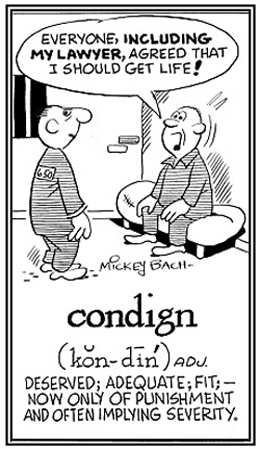
© ALL rights are reserved.
Go to this Word A Day Revisited Index
2. Etymology: from Middle English condigne, then from Old French, previously from Latin condignus; from com-, "together, with" + dignus, "worthy".

Go to this Word A Day Revisited Index
so you can see more of Mickey Bach's cartoons.
condignly (adverb), more condignly, most condignly
A reference to something which is fitting, or appropriate, and deserved; used especially about punishment: The judge condignly sentenced the killer to a deservedly severe life in prison without any time off.
daintily (adverb), more daintily, most daintily
1. In a refined and dignified manner: Sharon nibbled daintily as she ate her cake.
2. In a delicate way: Henry's mother daintily wrote the invitation cards for his birthday in black and gold ink.
2. In a delicate way: Henry's mother daintily wrote the invitation cards for his birthday in black and gold ink.
dainty (adjective), more dainty, most dainty
1. Delicately beautiful or charming; exquisite: Mary's hair was decorated with dainty red ribbons.
2. Delicious or a good choice; pleasing to the taste and, often, temptingly served as a delicate item: Dainty sandwiches were served to the guests on silver trays.
3. Of refined taste; discriminating and particular: Maxine took dainty sips of tea from her cup with her little dainty hands.
4. Etymology: about 1225, from Old French daintie, "price, value"; also "delicacy, pleasure", from Latin dignitatem, "worthiness, worth, beauty"; from dignus, "worthy". The meaning evolved from "choice, excellent", to "delicately pretty".
2. Delicious or a good choice; pleasing to the taste and, often, temptingly served as a delicate item: Dainty sandwiches were served to the guests on silver trays.
3. Of refined taste; discriminating and particular: Maxine took dainty sips of tea from her cup with her little dainty hands.
4. Etymology: about 1225, from Old French daintie, "price, value"; also "delicacy, pleasure", from Latin dignitatem, "worthiness, worth, beauty"; from dignus, "worthy". The meaning evolved from "choice, excellent", to "delicately pretty".
deign (DAYN) (verb), deigns; deigned; deigning
1. To do something in a way which shows that it is considered a great favor: Shirley doubts that her former boy friend will deign> to accept her invitation to her wedding.
2. To behave reluctantly towards other people to reveal information, as though they were socially or intellectually inferior: The owner of the house deigns to tell his neighbors how much money he received for the recent sale of his house.
2. To behave reluctantly towards other people to reveal information, as though they were socially or intellectually inferior: The owner of the house deigns to tell his neighbors how much money he received for the recent sale of his house.
Since Marsha was short of cash, she deigned to ask the salesman how much it would cost for a new cell phone.
3. To condescend or to behave in a patronizing manner, to be conscious of having come from a superior position; in keeping with a person's dignity: The congressman will deign to visit to the small community next week.The teacher would not even deign to talk to the student because the boy was such a miscreant.
The actress got out of the car and just walked on by and did not deign to speak to nor even acknowledge any of her fans who were standing on the sidewalk near the hotel entrance.
4. Etymology: from Old French deignier, from Latin dignari, "to consider worthy".
dignifiedly (adverb), more dignifiedly, most dignifiedly
Related to existing without agitation or stress and a little formal or serious: "Roy's secretary has a friendly but dignified manner."
"The hotel lobby where the couple stayed had a dignified environment which was also comfortable."
dignify (verb), dignifies; dignified; dignifying
1. To cause a situation to have a more serious and important quality: "Martin's wife was convinced that wearing formal clothing would help to dignify the special occasion."
2. To treat something or a person with respect or seriousness which is not deserved: "The politician said he would not dignify his opponent's slanderous remarks by responding to them."
2. To treat something or a person with respect or seriousness which is not deserved: "The politician said he would not dignify his opponent's slanderous remarks by responding to them."
Someone who has a high rank or an important position: "The reception at the embassy was attended by many foreign dignitaries."
1. A behavior that suggests seriousness and self control: "Iva's sister maintained her dignity throughout the job interview for a secretarial position."
2. Deserving honor and respect: "Jed said that he was proud to be from a country that cherishes freedom and human dignity."
2. Deserving honor and respect: "Jed said that he was proud to be from a country that cherishes freedom and human dignity."
1. A strong disapproval or dislike of someone or something which is considered undeserving of respect: The mayor regarded the proposal for building a shopping center in the city park with disdain.
2. Etymology: from Middle English from Old French desdeign, desdeignier; based on Latin dedignari from de-, "reversal" + dignari, "to consider worthy" from dignus,"worthy, deserving recognition".
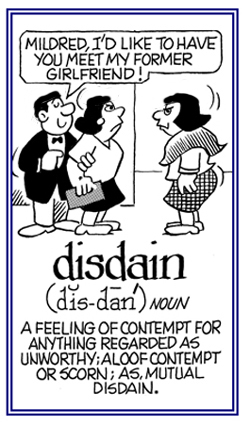
© ALL rights are reserved.
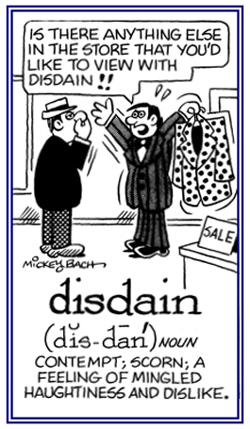
© ALL rights are reserved.
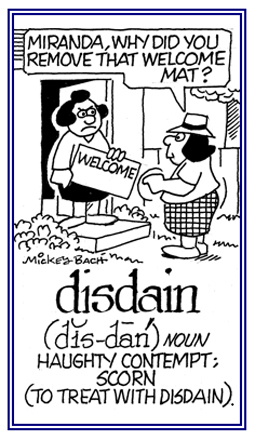
© ALL rights are reserved.
Go to this Word A Day Revisited Index
2. Etymology: from Middle English from Old French desdeign, desdeignier; based on Latin dedignari from de-, "reversal" + dignari, "to consider worthy" from dignus,"worthy, deserving recognition".



Go to this Word A Day Revisited Index
so you can see more of Mickey Bach's cartoons.
disdain (verb), disdains; disdained; disdaining
1. To strongly dislike, hate, or disapprove of something or a person: "People are disdaining the atrocious wars that are currently displacing so many people who are living in such bad conditions."
2. To refuse to do something because of feelings against some activity: "The actress disdained to answer questions about her personal life."
2. To refuse to do something because of feelings against some activity: "The actress disdained to answer questions about her personal life."
disdainful (adjective), more disdainful, most disdainful
Conveying a strong hatred for a person, or something, that is thought does not deserve respect: "When Janine was at the restaurant, she looked at the plate which the waiter brought with a disdainful glare because it was not what she had ordered."
disdainfully (adverb), more disdainfully, most disdainfully
A reference to a person who has a strong disapproval or dislike for something, or someone, who is regarded as not deserving respect: "The artist disdainfully reacted when someone criticized his work at the exhibition."
An anger or scorn aroused by something felt to be unjustified or incorrect: "The witness had to accept the indignance of being told to leave the courtroom."
indignant (adjective), more indignant, most indignant
A reference to showing or feeling anger because of something that is considered to be unfair or wrong: Ralph became very indignant when the waiter complained that the tip was too small.
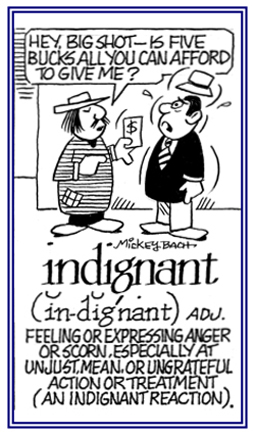
© ALL rights are reserved.
Go to this Word A Day Revisited Index
Several people wrote to the newspaper about the most indignant article they had ever seen regarding women's rights in their places of work.

Go to this Word A Day Revisited Index
so you can see more of Mickey Bach's cartoons.
Showing page 1 out of 2 pages of 23 main-word entries or main-word-entry groups.

